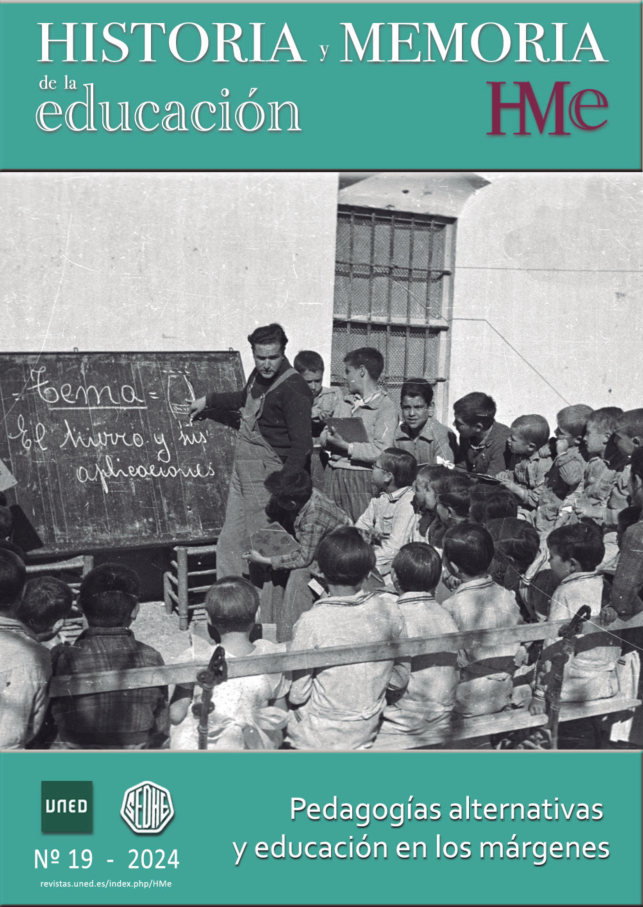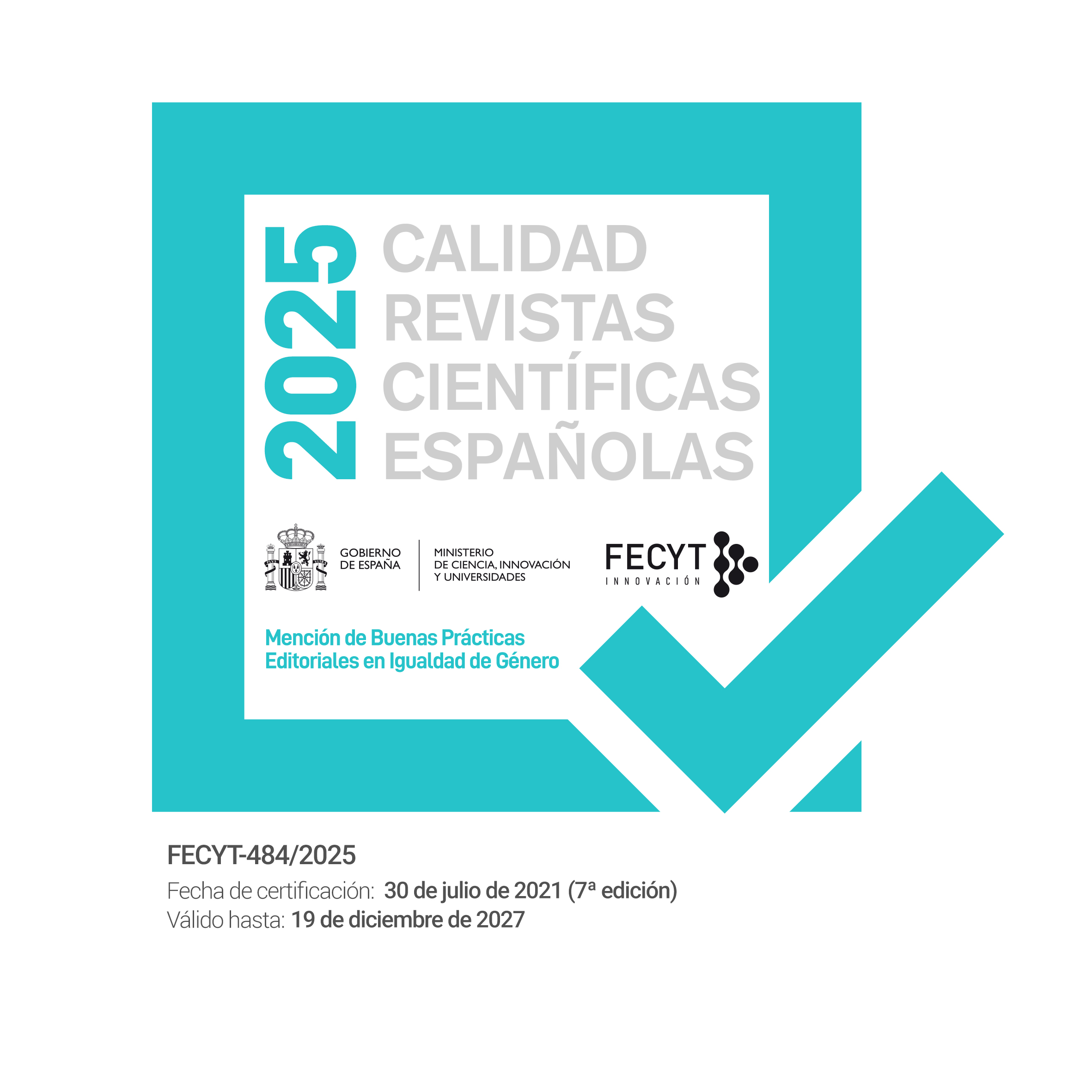“Open the doors to other worlds”: The UNESCO Fellowship and Travel Grants abroad and educational modernization in Spain (1953-1975)
DOI:
https://doi.org/10.5944/hme.19.2024.37691Keywords:
Fellowship, UNESCO, Francoism, Global Educational Governance, Educational modernizationAbstract
This research analyzes the development of the UNESCO fellowship program and Travel Grants in Spain and its relationship with the processes of educational modernization during the Franco dictatorship and the first years of democracy. The paper begins with a brief overview of the importance, from a theoretical point of view, of studying scholarship programs to understand the processes of transfer and configuration of educational discourses. From here, this research examines in depth the deployment of the program in Spain. The number of fellowships awarded by UNESCO is studied, as well as the topics or lines of research worked on and the countries that were visited by the beneficiaries. The last part of the article provides a summary approximation to the impact that the fellowships could have on the configuration of the field of Pedagogy during the Franco regime and the first years of the Transition. The article concludes that the fellowship and travel grants program underwent a process of change due to the importance that the Modernization Theory acquired within International Organizations with regard to the defining of educational policies during this period. On the other hand, it indicates the importance that the UNESCO program played as a significant factor in the processes of transfer and configuration of a new educational discourse or international narrative known as global educational governance or global architecture of education.
Downloads
References
«Entrevista a Julia Varela». Con-Ciencia Social, 2 (1998): 107-130.
Åkerlund, Andreas. «For Goodwill, Aid and Economic Growth: The Funding of Academic Exchange Through the Swedish Institute, 1945–2010». Nordic Journal of Educational History 2, no. 1 (2015): 119-140.
Åkerlund, Andreas. «The impact of foreign policy on educational exchange: the Swedish state scholarship programme 1938–1990». Paedagogica Historica 50, no. 3 (2014): 390-409.
Åkerlund, Andreas. «Transition aid and creating economic growth: Academic exchange between Sweden and Eastern Europe through the Swedish Institute 1990–2010». Place Branding and Public Diplomacy 12, no. 2-3 (2016): 124-138.
Albarzúa Cutroni, Anabella. «The Flow of UNESCO Experts toward Latin America: On the Asymmetrical Impact of the Missions, 1947–1984». En The History of UNESCO: Global Actions and Impacts, editado por Poul Duedahl, 181-200. New York: PlagraveMacmillan, 2016.
Boel, Jens. «UNESCO`s Fundamental Education Program, 1946-1958: Vision, Actions and Impact». En The History of UNESCO: Global Actions and Impacts, editado por Poul Duedahl, 153-167. New York: PlagraveMacmillan, 2016.
Bürgui, Regula. «Engineering the Free World: The Emergence of the OECD as an Actor in Education Policy, 1957–1972». En The OECD and the International Political Economy Since 1948, editado por Matthieu Leimgruber y Matthias Schmelzer, 285-310, Cham: Plagrave Macmillan, 2017.
Canales, Antonio Fco. «From soul to matter: the new Spanish Francoist pedagogy’s plunge into experimental pedagogy and the influence of Raymond Buyse». Paedagogica Historica 55, no. 3 (2019): 451-469.
Chabbott, Colette. Constructiong Education for Development: International Organizations and Education for All. London: Routledge, 2003.
Coll, César y Christine Gillieron. «Jean Piaget y la Escuela de Ginebra: itinerario y tendencias actuales». Infancia y Aprendizaje, 2 (1981): 56-96.
Coll, César. La conducta experimental en el niño. Barcelona: CEAC, 1978.
Coll, César. Psicología y curriculum: una aproximación psicopedagógica a la elaboración del curriculum escolar. Barcelona: Laia, 1988.
Corrales Morales, David. «Much Ado about Nothing? Lights and Shadows of the World Bank`s Support of Spanish Aspirations to Educational Modernization (1968-1972)». En Teaching Modernization Spanish and Latin American Educational Reform in the Cold War, editado por Óscar J. Martín-García y Lorenzo Delgado Gómez-Escalonilla, 127-148. New York: Berghahn Books, 2020.
Cuesta, Raimundo y Juan Mainer. «Perfil bibliográfico de Julia Varela». Con-Ciencia Social 2 (1998): 99-105.
De la Orden, Arturo. «La investigación educativa en España: antecedentes y perspectiva», Participación educativa 3, no. 5 (2014): 33-42.
Delgado Gómez-Escalonilla, Lorenzo y Óscar J. Martín García,. «El apoyo internacional a la reforma educativa en España». Historia y Memoria de la Educación 14 (2021): 177-208.
Delgado Gómez-Escalonilla, Lorenzo. «Educación para el desarrollo. OCDE, asistencia exterior y reforma de la enseñanza en la España del tardofranquismo». Foro de Educación 18, no. 2 (2020): 127-148.
Delgado Gómez-Escalonilla, Lorenzo. «International Organizations and Educational Change in Spain during the 1960s». Encounters in Theory & History of Education 21 (2020): 70-91.
Delgado Gómez-Escalonilla, Lorenzo. «L’Espagne franquiste au miroir de la France: de l’ostracisme à l’ouverture internationale». Siècles 20 (2004): 117-133.
Delgado Gómez-Escalonilla, Lorenzo. «Modernizadores y tecnócratas. Estados Unidos ante la política educativa y científica de la España del desarrollo». Historia y Política 34 (2015): 113-146.
Delgado Gómez-Escalonilla, Lorenzo. Viento de Poniente: El programa Fulbright en España. Madrid: LID Editorial/AECID, 2009.
Dorn, Charles y Karen Ghodsee. «The Cold War Politicization of Literacy: Communism, UNESCO, and the World Bank». Diplomatic History 36, no. 2 (2012): 373-398.
Dorn, Charles. «‘The World Schoolmaster’: Educational Reconstruction, Grayson Kefauver, and the Founding of UNESCO, 1942-46». History of Education 35, no. 3 (2006): 297-320.
Duedahl, Poul. «Out of the House: On the Global History of UNESCO, 1945-2015». En A History of UNESCO: Global Actions and Impacts, editado por Poul Duedahl, 3-23, London: Palgrave Macmillan, 2016.
Duedahl, Poul. «Peace in the minds: UNESCO, mental engineering and education». Foro de Educación 18, no. 2 (2020): 23-45.
Duedahl, Poul. «Selling Mankind: UNESCO and the Invetion of Global History». Journal of World History 22, no. 1 (2011): 101-133.
Elfert, Maren y Christian Ydesen. «The Influence of United States on Rise of Global Governance in Education: The OEEC and UNESCO in the post-Second World War Period». En Organizing the 20th-Century World: International Organization and the Emergence of International Public Administration 1920-60s, editado por Karen Gram-Skjoldager, Haakon Ikonomou y Torsten Kahlert, 73-89. London: Bloomsbury, 2019.
Elfert, Maren. «The OECD, American Power and the Rise of the ‘Economics of Education’ in the 1960s». En The OECD`s Historical Rise in Education, editado por Christian Ydesen, 39-61. Cham: PlagraveMacmillan, 2019.
Elfert, Maren. «The power struggle over education in developing countries: The case of the UNESCO-World Bank Co-operative program, 1964-1989». International Journal of Educational Development 81 (2021): 1-18.
Elfert, Maren. UNESCO`s Utopia of Lifeling Learning: An Intelectual History. London: Routledge, 2018.
Escolano, Agustín. «Los comienzos de la modernización pedagógica en el franquismo (1951-1964)». Revista Española de Pedagogía (REP) 192 (1992): 289-310.
Fernández Crestelo, Marta. «Entrevista a Julia Varela». Atlántica XXII: revista asturiana de información y pensamiento 24 (2013): 35-36.
Flury, Carmen, Michael Geiss y Rosalía Guerrero Cantarel. «Building the thecnological European Community throught education: European Mobility and Training programmes in the 1980s». European Educational Research Journal 20, no. 4 (2021): 390-407.
Foucault, Michel. Microfísica del poder. Madrid: la Piqeta, 1978.
Galván, Valentín. De vagos y maleantes: Michael Foucault en España. Barcelona: Virus Editorial, 2010.
Gilman, Nils. Mandarins of the Future: Modernization Theory in Cold War America. Baltimore: The John Hopkins University Press, 2004.
González-Delgado, Mariano y Tamar Groves. «La Unesco y la Ley General de Educación: La influencia de los organismos internacionales en torno a la modernización educativa en el franquismo», Historia y Memoria de la Educación 14 (2021): 209–252.
González-Delgado, Mariano y Tamar Groves. «Educational Transfer and Local Actors: International Intervention in Spain during the Late Franco Period». En Teaching Modernization Spanish and Latin American Educational Reform in the Cold War, editado por Óscar J. Martín García y Lorenzo Delgado Gómez-Escalonilla, 101-126. New York: Berghahn Books, 2020.
González-Delgado, Mariano. «La UNESCO y la modernización educativa en el franquismo: Origen y desarrollo institucional del programa Education for International Understanding en España (1950-1975)», Revista Internacional de Teoría e Investigación Educativa 1, no. 1 (2023): 1-13.
Grignon, Claude y Jean-Claude Passeron. Lo culto y lo popular. Miserabilismo y populismo en sociología y en literatura. Madrid: La Piqueta, 1992.
Groves, Tamar, Estrella Montes López, y Teresa Carvalho «The impact of international mobility as experienced by Spanish academics», European Journal of Higher Education 8, no. 1 (2018): 83-98.
Hof, Barabara y Regula Bürgi, . «The OECD as an arena for debate on the fufutre uses of computers in school». Globalization, Societies and Education 19, no. 2 (2021): 154-166.
Hof, Barabara y Regula Bürgi. «The OECD as an arena for debate on the fufutre uses of computers in school». Globalization, Societies and Education 19, no. 2 (2021): 154-166.
Hof, Barbara. «The turtle and the mouse: how constructivist learning theory shaped artificial intelligence and educational technology in the 1960s». History of Education 50, no. 1 (2020): 93-111.
Iglesias Galdo, Ana. «Identidades sociales y modos de educación. Entrevista a Julia Varela Fernández». Historia y Memoria de la Educación 12 (2020): 529-578.
Jones, Phillip W. Education, Poverty and the World Bank. New York: SensePublishers, 2006.
Jover Olmeda, Gonzalo y Bianca Thoilliez. «La pedagogía «au pluriel» y su incidencia en la reformulación del conocimiento teórico de la educación en España». En Francia en la educación de la España contemporánea (1808-2008), coordinado por José María Hernández Díaz, 219-247. Salamanca: Universidad de Salamanca, 2011.
Leonard, Mark, Catherine Stead y Conrad Smewing. Public Diplomacy. London: The Foering Policy Centre, 2002.
Luis Gómez, Alberto y Jesús Romero Morante. «Reformas educativas y formación permanente del profesorado en la última obra de Julia Varela: Memoria y olvido». Profesorado: Revista de currículum y formación del profesorado 13, no. 1 (2009): 231-295.
Mahamud-Angulo, Kira y Cecilia Milito-Barone. «Estancias y consultores para la formación del profesorado. Un pilar estratégico del intercambio cultural entre España y Estados Unidos (1960-1976)». En Modernización educativa y socialización política. Contenidos curriculares y manuales escolares en España durante el tardofranquismo y la transición democrática, editado por Manuel Ferraz Lorenzo, 151-190. Madrid: Morata, 2020.
Manheim, Jarol B. Strategic Public Diplomacy and American Foreign Policy. New York: Oxford University Press, 1994.
Martín García, Óscar J. «A complicated mission: The United States and Spanish students during the Johnson administration». Cold War History 13, no. 3 (2013): 311-329.
Martín García, Óscar J. «Soft Power, Modernization, and Security: US Educational Foreign Policy Toward Authoritarian Spain in the Cold War». History of Education Quarterly 63 (2023): 198-220.
Martín García, Óscar J. y Rosa Magnúsdottir. «Machineries of Persuasion: European Soft Power and Public Diplomacy during the Cold War». En Machineries of Persuasion: European Soft Power and Public Diplomacy during the Cold War, editado por Óscar J. Martín García y Rosa Magnúsdottir, 1-15. Berlín: De Gruyter Oldenbourg, 2019.
McCulloch, Gary. «Physics for the enquiring mind: The Nuffiled physics Ordinary-level course, 1962-1966». En Transnational Perspectives on Curriculum History, editado por Gary McCulloch, Ivor Goodson y Mariano González-Delgado, 27-40. London: Routledge, 2020.
Righ, William. Front Line Public Diplomacy. How US Embassies Communicate with Foreing Publics. New York: Plagrave MacMillan, 2014.
Scott-Smith, Giles. «Mapping the Undefinable: Some Thoughts on the Relevance of Exchange Programs within International Relations Theory». The Annals of the American Academy of Political and Social Science 616 (2008): 173-195.
Tournès, Ludovic y Giles Scott-Smith. «Introduction. A World of Exchanges: Conceptualizing the History of International Scholarship Programs (19th-21st Centuries)». En Global Exchanges: Scholarships and Exchange Programs in the Modern World, editado por Ludovic Tournès y Giles Scott-Smith, 1-30. New York: Berghahn, 2017.
Valls Giménez, Enric. «Converses amb César Coll». Comunicació Educativa 4 (1992): 12-17.
Varela, Julia y Fernando Álvarez-Uría, Arqueología de la escuela. Madrid: La Piqueta, 1991.
Varela, Julia. Modos de educación en la España de la Contrarreforma. Madrid: La Piqueta, 1983.
Viñao, Antonio. «La Ley General de Educación de 1970: ¿Final de una etapa?, ¿comienzo de otra?». En Modernización educativa y socialización política. Contenidos curriculares y manuales escolares en España durante el tardofranquismo y la transición democrática, editado por Manuel Ferraz Lorenzo, 125-149. Madrid: Morata, 2020.
Westberg, Johannes. «Combining Global and Local Narratives: A New Social History of the Expansion of Mass Education?». European Education 53, no. 3 (2020): 206-2014.
White, John. «‘The Peaceful and Constructive Battle’: UNESCO and Education for International Understanding in History and Geography, 1947–1967». International Journal of Educational Reform 20, no. 4 (2011): 303-321.
Wright Mills, Charles et al. Materiales de Sociología Crítica. Madrid: La Piqueta, 1986.
Ydesen, Christian y Anna Bomholt. «Accountability implications of the OECD’s economistic approach to education: A historical case analysis». Journal of Educational Change 21 (2020): 37-57.
Downloads
Published
How to Cite
Issue
Section
License
Copyright (c) 2023 Historia y Memoria de la Educación

This work is licensed under a Creative Commons Attribution-NonCommercial 4.0 International License.
Authors who publish in Historia y Memoria de la Educación agree to the following terms:
- Authors retain copyright and grant the journal right of first publication with the work simultaneously licensed under a Creative Commons Attribution-NonCommercial 4.0 International that allows others to share the work with an acknowledgement of the work's authorship and initial publication in this journal.
- Authors are able to enter into separate, additional contractual arrangements for the non-exclusive distribution of the journal's published version of the work (e.g., post it to an institutional repository or publish it in a book), with an acknowledgement of its initial publication in this journal.
- Authors are permitted and encouraged to post their work online (e.g., in institutional repositories or on their website) prior to and during the submission process, as it can lead to productive exchanges, as well as earlier and greater citation of published work (See The Effect of Open Access).












